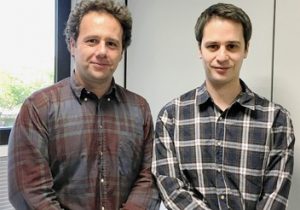Scientists identify the segmentation and consolidation mechanism of long-term memories

The research was carried out by Ignacio Sols, as the first author, and Lluís Fuentemilla, all of them researchers from The Institute of Neuroscience of the University of Barcelona (UB).
A study led by a team from the UB and the Bellvitge Biomedical Research Institute (IDIBELL) has identified a neural mechanism in humans that allows us to segment our experience in discrete memory units. According to the research, published in the scientific journal Current Biology, the brain identifies context changes as “frontiers” in the flow of our experience and uses them to fragment the course of events into small units of memory that can be stored long-term. The study shows that this process takes place during the identification of a boundary event thanks to the rapid reactivation of the flow of information that precedes it.
The research was carried out by Ignacio Sols, as the first author, and Lluís Fuentemilla, all of them researchers from the Cognition and Brain Plasticity Group of IDIBELL and The Institute of Neuroscience of the University of Barcelona (UB). Sara DuBrow and Lila Davachi, from the department of psychology at the University of New York, in the United States, also collaborated.
Continuous experiences, discrete memories
Despite our day-to-day experiences are lived seamlessly, without any cut, scientific research has shown that changes in the context can influence the representation we make of these experiences in our memory, where they become discrete memories. “What we were interested in finding out in this case was whether this process of compartmentalization of memories begins at the same moment in which the experience is lived, and what neural mechanism could be involved. “It is known from previous studies in animals that the active neural pattern during a certain experience is reactivated once this experience ends, so the idea was to observe in a group of volunteers what happened at the brain level when a certain episode ended“, explains researcher Ignacio Soles.
The segmentation theory of events, on which the published study is based, argues that the brain acts on the grounds of constant predictions based on previous experience; When these predictions fail, for example because there is an unexpected change of context, the brain interprets this moment as a boundary event, which delimits the neural coding of the lived experiences.
Article reference:
Sols. I, DuBrow, S., Davachi, L., Fuentemilla, L. “Event Boundaries Trigger Rapid Memory Reinstatement of the Prior Events to Promote Their Representation in Long-Term Memory“. Current biology, November 2017. Doi: 10.1016/j.cub.2017.09.057



No Comments